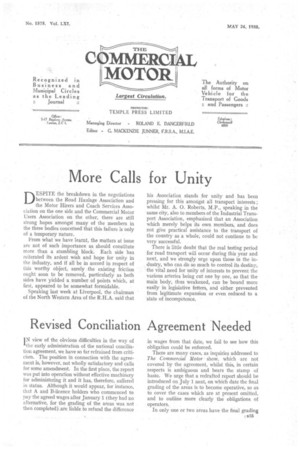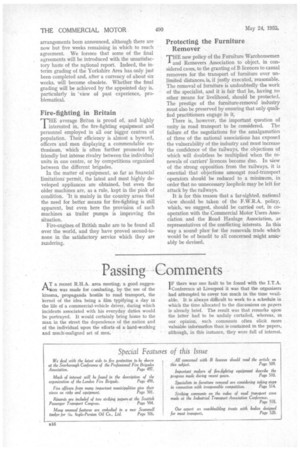Revised Conciliation Agreement Needed
Page 33

Page 34

If you've noticed an error in this article please click here to report it so we can fix it.
I N view of the obvious difficulties in the way of the early administration of the national conciliation agreement, we have so far refrained from criticism. The position in connection with the agreement is, however, not wholly satisfactory and calls for some amendment. In the first place, the report was put into operation without effective machinery for administering it and it has, therefore, suffered in status. Although it would appear, for instance, that A and B-licence holders who commenced to pay the agreed wages after January 1 (they had no alternative, for the grading of the areas was not then completed). are liable to refund the difference in wages from that date, we fail to see how this obligation could be enforced.
There are many cases, as inquiries addressed to The Commercial Motor• show, which are not covered by the agreement, whilst this, in certain respects is ambiguous and bears the stamp of haste. We urge that a redrafted report should be introduced on July 1 next, on which date the final grading of the areas is to become operative, so as to cover the cases which are at present omitted, and to outline more clearly the obligations of operators.
In only one or two areas have the final grading B15 arrangements been announced, although there are now but five weeks remaining in which to reach agreement. We foresee that some of the final agreements will be introduced with the unsatisfactory haste of the national report. Indeed, the interim grading of the Yorkshire Area has only just been completed and, after a currency of about six weeks, will become obsolete. Whether the final grading will be achieved by the appointed day is, particularly in 'view of past experience, problematical.
Fire-fighting in Britain
THE average Briton is proud of, and highly interested in, the fire-fighting equipment and personnel employed in all our bigger centres of population. Their efficiency is almost a byword, officers and men displaying a commendable enthusiasm, which is often further promoted by friendly but intense rivalry between the individual units in one centre, or by competitions organized between the different brigades.
In the matter of equipment, so far as financial limitations permit, the latest and most highly developed appliances are obtained, but even the older machines are, as a rule, kept in the pink of condition. it is mainly in the country areas that the need for better means for fire-fighting is still apparent, but even here the provision of such machines as trailer pumps is improving the situation.
Fire-engines of British make are to be found all over the world, and they have proved second-tonone in the satisfactory service which they are rendering.
Protecting the Furniture Remover
THE new policy of the Furniture Warehousemen and Removers Association to object, in considered cases, to the granting of B licences to casual removers for the transport of furniture over unlimited distances, is, if justly executed, reasonable. The removal of furniture is undoubtedly the work of the specialist, and it is fair that he, having no other means for livelihood, should be protected. The prestige of the furniture-removal industry must also be preserved by ensuring that only qualified practitioners engage in it.
There is, however, the important question of unity in road transport to be considered. The failure of the negotiations for the amalgamation of three of the national associations has exposed the vulnerability of the industry and must increase the confidence of the railways, the objections of which will doubtless be multiplied when the renewals of carriers' licences become due. In view of the strong opposition from the railways, it is essential that objections amongst road-transport operators should be reduced to a minimum, in order that no unnecessary loophole may be left for attack by the railways.
It is for this reason that a far-sighted, national view should be taken of the F.W.R.A. policy, which, we suggest, should be carried out, in cooperation with the Commercial Motor Users Association and the Road Haulage Association, as representatives of the conflicting interests. In this way a sound plan for the removals trade which would be of benefit to all concerned might amicably be devised.




































































































